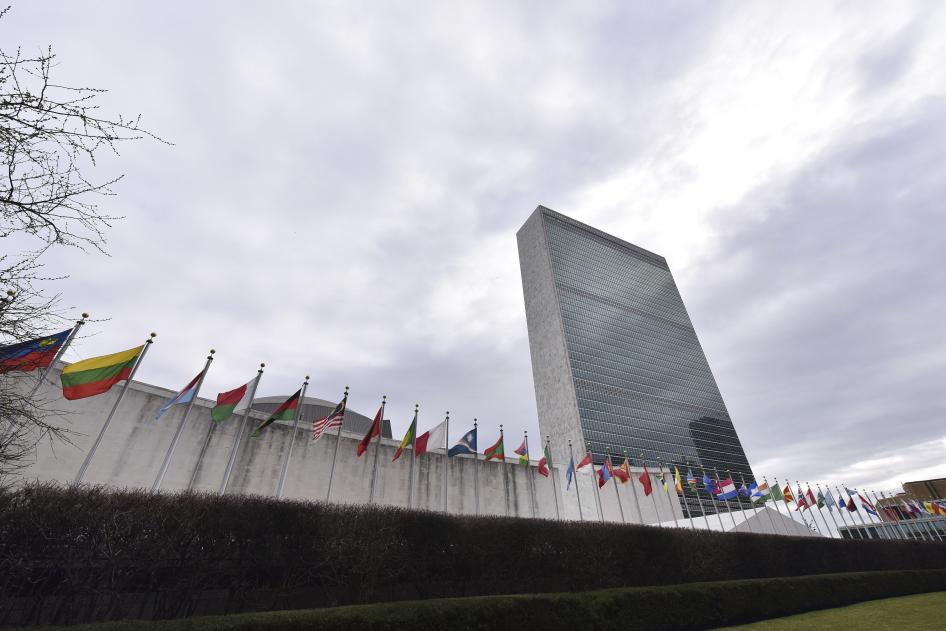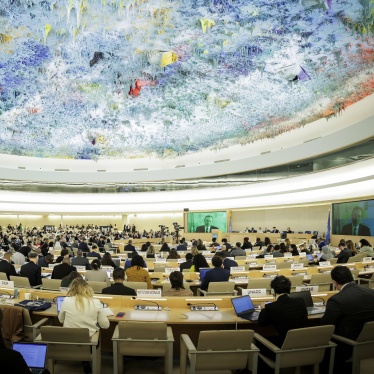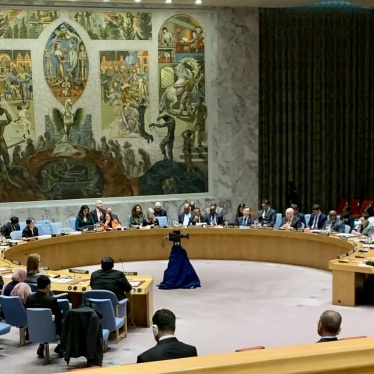United Nations member countries should use the General Assembly session ahead of the world body’s 75th anniversary to recommit to human rights, Human Rights Watch said today. The largely virtual high-level session of the General Assembly will begin on September 22, 2020.
UN members should soundly reject China’s apparent long-term efforts to severely undermine the UN’s human rights pillar and the United States attempts to selectively reinterpret international human rights standards. Members should reinforce and recommit to gender equality, including during the session on the 25th anniversary of the 1995 Fourth World Conference on Women.
“The creation of the United Nations 75 years ago should be a moment of unabashed celebration, but abusive leaders still harness every crisis to stomp on basic freedoms and ride roughshod over the rights of women, minorities, and marginalized people,” said Louis Charbonneau, UN director at Human Rights Watch. “The world needs more countries, big and small, willing to demonstrate global human rights leadership and publicly call out abusive governments, such as China, Saudi Arabia, and Russia, and democracies like the United States.”
Because of the Covid-19 pandemic, UN Secretary-General Antonio Guterres will be one of the few leaders to speak from the General Assembly podium. He should urge UN members to heed his recent Call to Action on Human Rights. In that appeal, Guterres pledged to rekindle the UN’s attention to rights issues, warning that “disregard for human rights is widespread” around the world.
The secretary-general should drop his aversion to criticizing specific countries. In particular, he should publicly condemn China’s abusive national security law for Hong Kong and its mass detention of Turkic Muslims in Xinjiang. His reluctance to speak out publicly on China’s abuses runs counter to the spirit of his Call to Action. He has not responded to a June letter from nongovernmental organizations, including Human Rights Watch, urging him to appoint a special envoy to monitor abuses in Hong Kong and elsewhere in China.
The secretary-general should also publicly express concerns about US plans to promote the Trump administration’s Commission on Unalienable Rights. US Secretary of State Mike Pompeo is expected to host a side event on the Universal Declaration of Human Rights to promote the commission, an exercise to “re-examine” internationally recognized rights.
“The US Commission on Unalienable Rights is a deeply misguided enterprise with the potential to undermine human rights protections that governments find disagreeable,” Charbonneau said. “The commission promotes the false premise that too many people, particularly lesbian, gay, bisexual, and transgender (LGBT) people and women, are asserting their rights.”
UN members that participate in another possible Trump administration event during the General Assembly’s high-level week on the Women’s Global Development and Prosperity initiative should reject the US government’s notion that one can separate women’s economic rights from other human rights, including the right to live free of violence or the right to health.
While the United States has reduced its influence at the UN – withdrawing from the Human Rights Council, withholding funds from the UN Population Fund, and possibly leaving the World Health Organization – China has been doing the opposite.
The Chinese government has sought to expand and deepen its influence on UN affairs, but it has used that influence to undermine and try to defund mechanisms on human rights, one of the UN’s three fundamental pillars, alongside peace and security and development. China has constantly lobbied the UN budget committee to deny funding or reduce staff for missions that monitor human rights violations or gather evidence of serious crimes in places like Syria and Myanmar.
UN delegations should use the October 1 high-level meeting celebrating the Beijing Declaration and Platform for Action to strongly reaffirm their commitment to gender equality. The Covid-19 pandemic, school closures, and economic crisis exacerbate existing inequalities, with profound consequences for women and girls, such as increased caregiving roles, greater exposure to gender-based violence, and increased barriers to education and economic empowerment.
“Many of the hard-fought gains on women’s rights over the past 25 years are under threat, including through stepped-up attacks on sexual and reproductive health and rights from the US,” Charbonneau said. “China has harassed and intimidated women’s rights activists and censored social media accounts and posts promoting gender equality.”
The Covid-19 pandemic has killed nearly a million people worldwide this year. Lockdowns and a global economic downturn have disproportionately affected those living in or vulnerable to poverty. The pandemic’s lasting impact on the economic and social rights, including access to adequate health care, of those in precarious situations is of special concern. UN member countries should take advantage of the UN General Assembly session to accelerate discussions on recovery efforts that will permanently reduce economic and social inequalities.
“UN members at the General Assembly should condemn all attempts to turn back the clock and weaken the global human rights framework,” Charbonneau said. “China wants to recreate the UN’s human rights pillar in its anti-rights image. The US is urging the world to cherry-pick the rights they like and reject the ones they don’t. World leaders should respond with a resounding ‘no’ and demand that human rights be respected and expanded, not curtailed or cast aside.”








